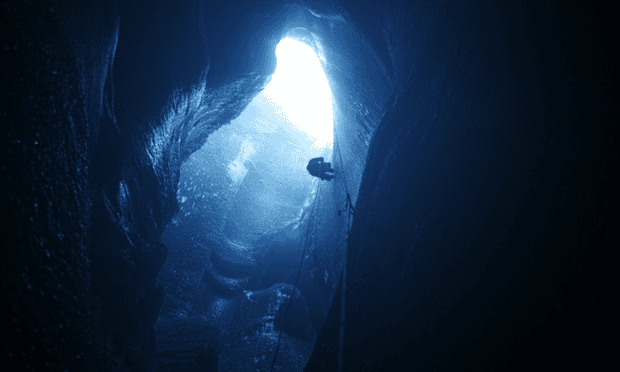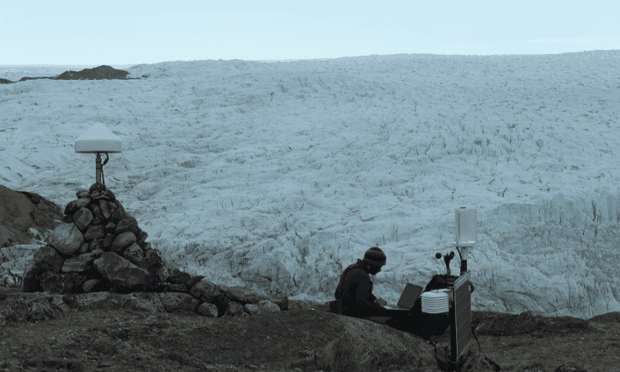Global warming is causing rain to melt the Greenland ice sheet
Posted on 14 July 2015 by John Abraham
Greenland, one of the largest ice sheets in the world, is melting. In fact, it is melting ahead of schedule as the world warms. Scientists are working hard to deepen their understanding of this ice sheet’s behavior so that we can predict how fast and how much of the ice sheet will melt in the coming decades and centuries.
It might seem obvious that in a warming world, the Greenland ice sheet will melt. But, what seems obvious and simple can be more complex when investigated more deeply. With respect to Greenland, it is expected that warmer temperatures increase melting but warmer temperatures can also mean more snowfall, as there is more moisture in warm air which can then fall as snow. So, it has been a question of which of these two competing processes would win out. Would Greenland get smaller because of melting or would it grow as more snow fell?
Over the past few years, the verdict has become clear. The Greenland ice sheet is losing mass at an increasing rate. In fact, Greenland currently contributes twice as much as the Antarctic to rising sea levels.

Abseiling into a moulin on the Greenland ice sheet. Photograph: Sam Doyle/Aberystwyth University
A new study, just published in Nature Geoscience, makes an important new contribution to our understanding of the forces at play in Greenland. Dr Samuel Doyle and an international team captured the wide-scale effects of an unusual week of warm, wet weather in late August and early September, 2011. They found that cyclonic weather led to extreme surface runoff – a combination of ice melt and rain – that overwhelmed the ice sheet’s basal drainage system. This drive a marked increase in ice flow across the entire western sector of the ice sheet that extended 140 km into the ice sheet’s interior. According to Dr. Doyle,
It wasn’t just rainfall. We saw 10 to 15% of the total annual surface melt occur in this event in late summer 2011. When this water reached the bed, the ice sheet lifted up and moved faster towards the sea.
The cyclonic weather system delivered heat and rain to the western edge of the Greenland ice sheet and under these warm, wet, cloudy conditions the way that the ice sheet receives energy for melt is very different to that under the more typical clear sky conditions. As we all know from a cloudy day, clouds block a certain amount of sunshine, but under certain conditions they can absorb the outgoing longwave radiation and re-radiate it back to the surface. This is why a cloudy night is often warmer than when the sky is clear. The same thing happens on the ice sheet.
In fact during the August 2011 weather event, melt continued throughout both day and night creating exceptionally high daily melt totals for this time of year. Moisture in the atmosphere also reduces the rate at which the air cools as it rises over the ice sheet, allowing warm temperatures and therefore melt and rain to attain abnormally high elevations. The heat released by condensation and by rain refreezing in the snowpack enhanced melt even further.

Maintaining a GPS in front of Russell Glacier. Photograph: Heidi Sevestre/University Centre in Svalbard
Even given these factors, the water runoff from melt and rain did not exceed mid-summer peak values when ice flow was relatively slow. This is because the ice sheet’s drainage system continually adapts to melt inputs: in mid-summer an efficient drainage system forms and the ice sheet can easily accommodate high water inputs. This isn’t the case in late summer though, as the drainage system rapidly freezes shut when air temperatures fall below zero. Dr. Doyle told me,
The late-summer timing was critical. The event occurred after the end of the melt season and the ice-sheet’s drainage system had started to close down. In this state the ice sheet’s drainage system just couldn’t cope.
Professor Alun Hubbard added,
It is like an urban sewerage system that is temporarily overwhelmed by an intense rain-storm. The ice sheet plumbing – literally a network of pipes, cavities and channels - gets backed up by the sheer quantity of runoff draining into it, leading to flooding and high water pressures, which literally lifts the ice sheet up off its bed, reducing basal friction and sending it on its way.
If the precise timing of rainfall/melt events is critical to the ice sheets flow response, predicting the future of the Greenland ice sheet may therefore be a more difficult task than was originally thought. After all, weather is notoriously difficult to predict. Hubbard concluded,
The jury is out as to whether the ‘rainfall’ event identified in our study has a lasting influence on the evolution of the Greenland ice sheet. Just as in many regions of the planet, observed climate warming doesn’t just mean hotter summers and milder winters; it’s more complex than that and more often it means more intense storm events at unusual times of the year.
So why do we care about this? Well, in a warming world, we expect, and are already observing, increases in warm, wet weather in place of snowfall, so the effect the authors find may be more important if predicted changes in Greenland’s climate are realized. Professor Jason Box summed it up,































 Arguments
Arguments






























And part of the reason is that we just had the warmest June on record.
ds.data.jma.go.jp/tcc/tcc/products/gwp/temp/jun_wld.html
Recommended supplemental reading:
Greenland is Experiencing a Sudden and Rapid Melt Season Onset by Pakalolo, The Daily Kos, July 9, 2015
Recommended supplemental reading:
The troubling reason why Greenland may melt faster than expected by Elahe Izadi, Energy & Environment, Washington Post, July 17, 2015
Lecutre R Alley
Link Paper,
Thanks JH,
That must make the Ice cliffs at the glaciers fronts higher and that already means trouble in Antartica in a simulation at 400ppm and ~2C warmer bottom water (consistent with early Pliocene, although the 400ppm was from a 2003 paper and 350ppm is more commonly reproted now, and th ebottom waters are rising in temperature), incorportating hydrofracturing and ice cliffs collapse they found sea level rose, ~3-4m in 100 years, 5m in 200years and 17m in ~1000-2000years.
Add in Greenland and the rapid warming coming as we are 470ppmCO2e and several metres of sea level rise by 2100 looks more likely everytime new research is published.
And 2200, only 200 years, Rome been here 2000years or more and that reallt does mean we should be planning to move most of th emajor coastal cities of world fairly soon.
http://www.clim-past.net/7/1459/2011/cp-7-1459-2011.pdf
This papers figure on page 2 (1461 in journal) shows how CO2 has been at 400ppm for ~12million years and 450ppm last 15-20million, just in case anyone actually beliefs in th etotally ficticious carbon budget oftne procliamed.
Dear Moderator,
Why when I put a link in does it always go to the start of the post and not were the cursor is in the text?
[JH] I have never experienced the problem that you are encountering re the placement of links. I therefore cannot answer you question. You may want to check the HTML code of your draft comment when this happens next.
Sorry the last sentence should read,
This paper's figure on page 2 of pdf (1461 in journal), show how CO2 hasn't been at 350ppm for 4-5million years, 400pppm for 12million years and 460ppm for 15-20 million yearsm just in case people feel we have a carbon budget.
ranyl:
I'm not sure how you are trying to enter a link, but here is the "easy" way:
For example, after I typed this text, I selected it, and then clicked the link icon, pasted in a link to your 16:15 PM comment, changed it to open in a new window, and closed the box. The link is now hidden behind the "after I typed this text" phrase, and it has not moved from where I typed it.
I think a lot of times people don't realize that they should type text first, then select it before trying to linkify it.
If that is what you are doing, I can't help. :-)
(Actually, it looks like I forgot to choose "open in a new window". The link opens in thr same window.)
Ranyl,
My computer used to have the same issue you have. At the same time I used another computer and it did not have the problem so I concluded it was something in my computer. The issue went away when I updated the operating system.